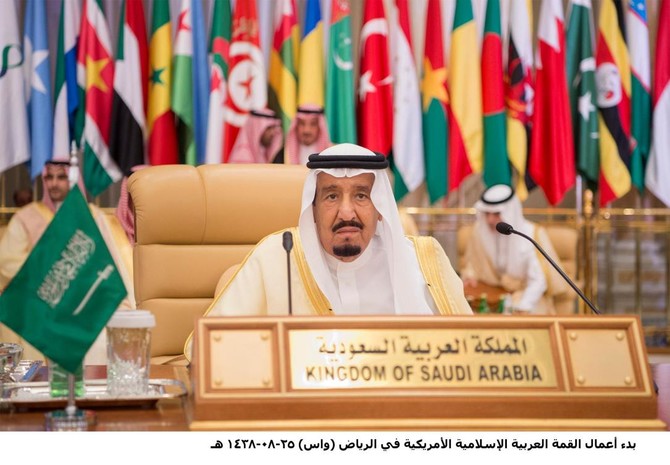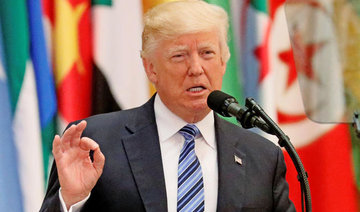"In the name of Allah, the most Merciful, the most gracious.
All praise is due to Allah, and Allah's peace and blessings be upon His messenger.
Mr. President Donald Trump of the United States of America; Your Majesty, Excellencies and Highnesses:
I welcome you in your second country, the Kingdom of Saudi Arabia. May the leaders of the Arab and Muslim worlds allow me to welcome His Excellency President Donald Trump of the United States of America to an unprecedented historic summit that is being held at a very important and extremely serious time.
Our meeting with His Excellency President of the United States of America, a country enjoying strong bonds of friendship and relationship with many of our countries, does reflect His Excellency's keenness on enhancing cooperation and coordinating stances in various fields. The meeting significantly shows that our 55 Arab and Islamic countries attending the summit today with a population exceeding 1.5 billion, are an important partner in fighting the forces of extremism and terrorism and achieving world peace, security and stability. His Excellency holds many hopes and aspirations for cooperation with the Arab and Muslim world.
As we extend our thanks to and appreciation of His Excellency for his response to attend and participate in this summit, we reaffirm our happiness and gratitude for His Excellency's choice of the Kingdom of Saudi Arabia and this summit as His Excellency's first trip and external participation since assuming office. This does reflect the care given by His Excellency and his country to this summit. At the same time, we reaffirm that we share His Excellency the same noble feelings in terms of constructive cooperation to renounce extremism and work on countering terrorism in all its forms and manifestations, drying-up its sources, stopping all means of financing or disseminating terrorism, and firmly addressing this serious scourge on humanity as a whole.
We are meeting today at this summit to express the seriousness in taking rapid steps to promote a genuine partnership with the friendly United States of America in a way that serves our common interests and contributes to achieving security, peace and development for all mankind, which is confirmed by our Islamic religion.
Dear brothers and friends:
Due to our responsibility before Allah and then before our peoples and the world, we have to stand united to fight the forces of evil and extremism whatever their source, in compliance with the orders of our true Islamic religion. Islam was and will remain the religion of mercy, tolerance and coexistence which were confirmed by clear examples. During its bright eras, Islam provided the best examples in coexistence and harmony among interreligious and intercultural. But today, we see some who considered themselves as Muslims seek to present a distorted image of our religion where they seek to link this great religion with violence.
We say to our brothers, sisters, sons and daughters of Muslims everywhere that one of the most important purposes of Islamic law is self-preservation and there is no honor in committing crimes. Islam is a religion of peace and tolerance. Islam urged reconstruction of the land and prohibition of destruction and corruption. Islam considered killing an innocent as killing all people. Our way to achieve purposes of our religion and win the paradise is to spread the tolerant values of Islam based on peace, moderation and prevention of destruction and corruption on the ground.
We, as countries and peoples, condemn all forms of harm to relations of the Islamic countries with the friendly countries and classification of peoples and states based on religious or sectarian basis. Such abhorrent acts are only made as a result of attempts to exploit Islam as a cover for political purposes that fuel hatred, extremism, terrorism and religious and sectarian conflicts. The Iranian regime and its affiliated groups and organizations such as Hezbollah and the Houthis, as well as ISIS (Daesh) and Al-Qaeda and others are clear examples.
The Iranian regime spearheads the global terrorism since Khomeini revolution until today. Since 300 years ago, we, in this country, did not witness terrorism or extremism until Khomeini revolution emerged in 1979.
Iran has rejected initiatives of good neighborhood provided by our countries based on good faith. Iran replaced these initiatives with expansionist ambitions, criminal practices, interferences in the internal affairs of other countries, flagrant violations of the international law, and violations of the principles of good-neighborliness, coexistence and mutual respect.
The Iranian regime erroneously thought that our silence a sign of weakness and our wisdom a retreat. Later on, we had enough of its hostile practices and interventions, as we have seen in Yemen and other countries in the region.
We say this, as we confirm, at the same time, our appreciation of and respect to the Iranian people, who will not be blamed for the crimes of their regime.
The Kingdom of Saudi Arabia has long suffered from and was a target of terrorism because it is the focus of Islam and Qibla of Muslims. The terrorist thought is seeking to achieve its fake legitimacy and spreading through targeting Muslims Qibla and center of their gravity.
Thanks to Allah Almighty, we have succeeded to confront the terrorist acts, thwarted numerous terror attempts and helped our friendly countries all over the world to evade plots targeting their security and destabilizing their well-being.
Dear Brothers and Friends:
Pursuant to the efforts being exerted to fight terrorism, the Gulf Cooperation Council member countries concluded today a historic arrangement with the United States of America for taking firm measures to foil terror financing, i.e. establishing a center in the city of Riyadh aiming to root-out the sources of finance of terrorism. Thus, we look forward to more countries to join the center in future. This arrangement would be taken as an example as it is based on our current efforts in this regard. In the name of my brothers the leaders of Islamic countries now convening in Riyadh, I once again confirm that we would never be lenient in sending to justice whoever finance or support terrorism in any form or under any manifestation as he would be subject to decisive justice.
Mr. President,
Dear Bothers and Friends,
As part of our war against terrorism, we confirm our determination to wipe out Daesh organization and other terrorist organizations, regardless of their religion, sect or thought. This is why we have formed the Islamic Military Alliance to Fight Terrorism, considered a pioneering step to besiege terrorism.
Terrorism is a result of extremism, no doubt. Amid the need to confront it, we announce today the launch of the International Center for Combating Extremism, a measure aiming, in collaboration with peace-loving countries and international organizations, at spreading the principles of moderation, confronting the attempts to lure the juniors, vaccinating families and societies against deviant thought and waging a fierce war against the weak logic and controversy of the terrorists.
Rooting-out terrorism will not be achieved through direct confrontation only, but also through achieving sustainable development in its capacity as the most successful vaccinating dose, with the help of God Almighty, a notion embodied in the Kingdom of Saudi Arabia's vision 2030 in all its aspects, citing the keenness to invest in the youths, empowering of women, diversifying the economy and developing the education. No doubt, the Kingdom of Saudi Arabia supports and encourages every orientation of the brotherly and friendly countries aiming at activating sustainable development in their countries.
We stress that achieving peace between the Palestinians and the Israelis is a just and necessary quest that requires joint sacrifices and sincere determination for the interest of all. The international community ought to intensify efforts to find a solution to the Syrian crisis to achieve the aspirations of the Syrian people and preserve Syria's unity and sovereignty.
Your Majesties, Excellences and Highnesses:
The hopes and aspirations of our peoples are great, and our responsibilities to achieve these aspirations are immense, but your concern and keenness will make us resolute to face these duties. We are determined to hold on to development as a strategic goal to confront extremism and terrorism and provide a prosperous life.
May Allah help us all to achieve success in what brings the good to our peoples. Peace, mercy and blessings of God be upon you".































